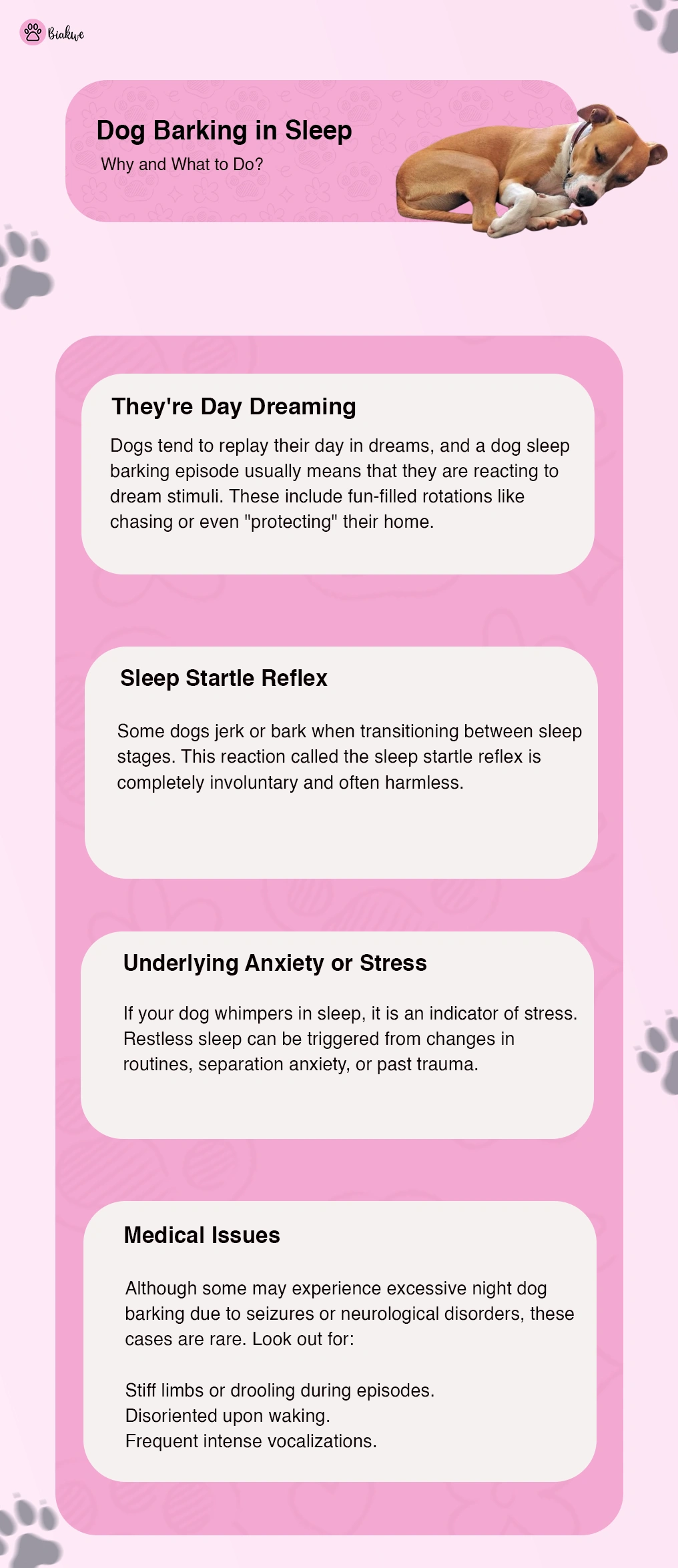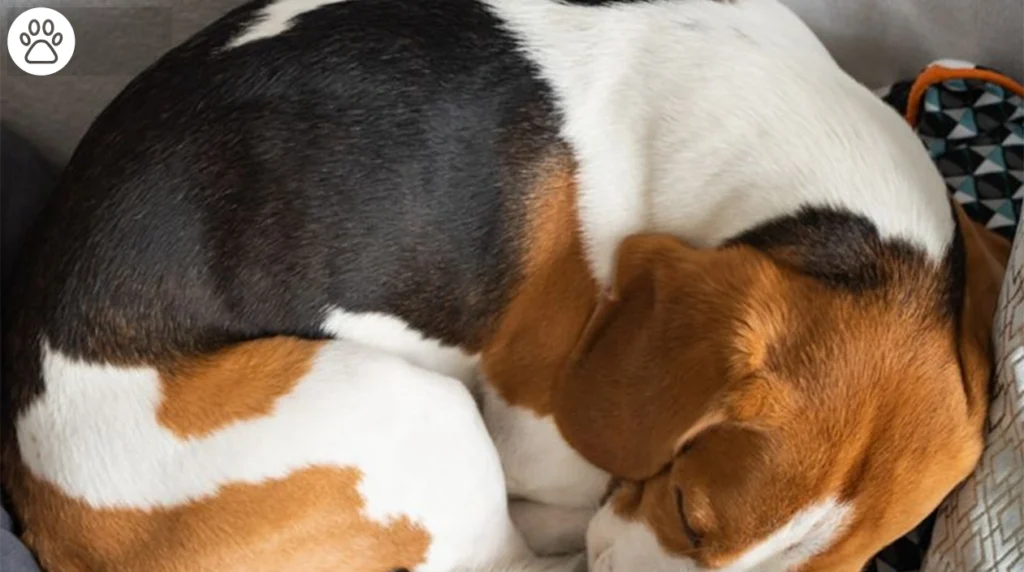“Dogs dream about the things they love—chasing squirrels, playing fetch, and yes, even barking at imaginary intruders.” – Stanley Coren
Have you ever seen your canine squeak and whimper in their sleep or even let out a sharp bark? That sight is both puzzling and cute but begs the question: why do dogs bark in their sleep, and is it problematic?
We will delve into the consideration of whether the dog dreaming is a dream he barks towards or whether there are medical reasons that warrant concern. Furthermore, you will discover effective methods of keeping your dog peacefully dozing without ‘midnight barking dog’ interruptions.
Why Do Dogs Bark in Their Sleep?
Similarly to humans, dogs experience REM (rapid eye movement) sleep, which enables them to dream. If dogs bark in their sleep, it indicates that their mind is working to make sense of everything they have experienced during the day.
Visit: Can Dogs Have Catnip? What You Must Know Before Sharing
They’re Daydreaming (Most Common Reason)
Dogs tend to replay their day in dreams, and a dog sleep barking episode usually means that they are reacting to dream stimuli. These include fun-filled rotations like chasing or even “protecting” their home.
Did You Know? Studies show that smaller dogs dream more frequently but for shorter amounts of time. In contrast, larger breeds have deeper and longer dreams.

Sleep Startle Reflex (Sudden Twitching and Barking)
Some dogs jerk or bark when transitioning between sleep stages. This reaction, called the sleep startle reflex, is completely involuntary and often harmless.
Falling in a dream is quite common in a human’s life, but occurring in a dog’s life is still a mystery.
Underlying Anxiety or Stress
If your dog whimpers in sleep, it is an indicator of stress. Restless sleep can be triggered by changes in routines, separation anxiety, or past trauma.
Discover: Best Natural Antibiotics for Dogs: Safe Alternatives to Medication
Medical Issues (Less Common but Important)
Although some may experience excessive night dog barking due to seizures or neurological disorders, these cases are rare. Look out for:
- Stiff limbs or drooling during episodes.
- Disoriented upon waking.
- Frequent intense vocalizations.
If symptoms appear, reach out to a veterinarian.
What Measures Can Be Taken When Dogs Bark in Their Sleep?
Most instances of dog barking in sleep do not cause any medical concern. However, if your dog does sleep bark and it disrupts family routines and activities, consider these tips:
Don’t Wake Dogs Incorrectly
A dreaming dog that has been suddenly woken up may become disoriented and aggressive, so it is best to gently call out their name or stroke their back gently.
Enhance Their Sleeping Conditions
- White Noise Machines: These will mask any outer stimuli, such as street sounds.
- Comfortable Bedding: Orthopedic beds with borders help old dogs rest without shifting too much.
- Calming Scents: Soothing scented Lavender or chamomile of sprays helps provide relaxation

Check this out: Weiner Dogs: Price, Breeds, and Mini Dachshund Costs
Enrichment During the Day = Relaxation During the Night
A dog that is physically tired is more likely to daydream, so make sure to exert them through
- 30 plus minutes of vigorous exercise daily.
- Mental exercise in the form of puzzle toys or training.
- An established bedtime schedule.
Address medical issues, if any
If a dog barking while sleeping increases to thrashing violently or passing out, without bladder control.
Make an appointment with a vet for urgency to assess for seizure or pain.
Explore: Natural Pain Relief for Dogs: Safe Alternatives to Medication
Sleeping Barks According to Breed
Are some dogs more chatty in their sleep than others? Yes! Border Collies tend to bark in their sleep as they dream about “working”, while other herding dogs and terriers may yip during chase dreams. Sighthounds like Greyhounds tend to have very quiet sleep; on the other hand, protective breeds like German Shepherds and Rottweilers might growl or bark at dream “intruders”.
Key Insights
- Higher-energy breeds usually have more active dream cycles.
- Rescue dogs are likely to be more vocal due to their experiences.
- Brachycephalic breeds (Bulldogs, Pugs) are likely to snore; however, this does not mean they bark more.
Knowing the general behavior tendencies of your dog’s breed will help you understand the difference between normal dog sleep barking and more concerning sounds.

Learn More: Top Benefits Of Apple Cider Vinegar For Dogs
Conclusion
For the most part, dog barking in sleep is typical behavior. Most dogs sleep and bark while ‘protecting’ an imaginary territory or chasing after dreamy squirrels. These nightly barks and whimpers reflect their brains processing the events of the day. While some dog whining in sleep accompanied by twitching in sleep is generally harmless, looking out for excessive vocalizations, stiff movements, or disorientation upon waking should signal potential health problems.
To curb sleep barking, ensure that your dog spends enough time exercising during the day, has a comfortable sleeping area, and does not get disrupted. And don’t worry too much—a dog that can bark in their dreams is automatically healthy.
For more tips from experts in the field of canine behavior and care, visit Biakwe.com because every dreamy woof deserves to be understood!
